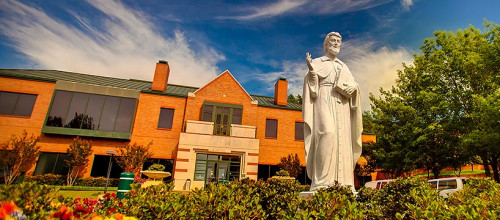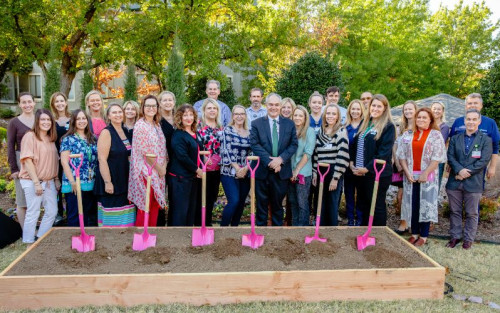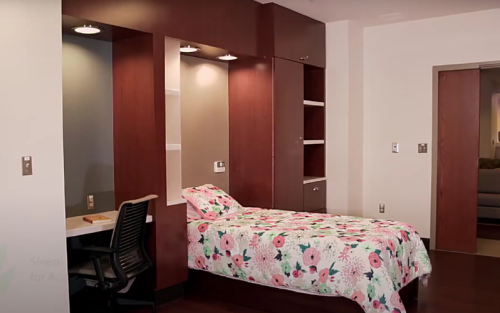






Laureate Psychiatric Clinic and Hospital
Treatment Focus
This center treats mental health conditions and co-occurring substance use. You receive collaborative, individualized treatment that addresses both issues for whole-person healing.
Primary Level of Care
Offering intensive care with 24/7 monitoring, residential treatment is typically 30 days and can cover multiple levels of care. Length can range from 14 to 90 days typically.
This provider hasn't verified their profile's information. Are you the owner of this center? Claim your listing to better manage your presence on Recovery.com.
Treatment Focus
This center treats mental health conditions and co-occurring substance use. You receive collaborative, individualized treatment that addresses both issues for whole-person healing.
Primary Level of Care
Offering intensive care with 24/7 monitoring, residential treatment is typically 30 days and can cover multiple levels of care. Length can range from 14 to 90 days typically.
Provider's Policy
Saint Francis Health System entities participate in many PPO and HMO plans. Major credit cards are also accepted.
Laureate Psychiatric Clinic and Hospital
Laureate Psychiatric Clinic and Hospital
About Laureate Psychiatric Clinic and Hospital
Located on 47 acres of rolling hills in Tulsa, Oklahoma, Laureate Psychiatric Clinic and Hospital treats ADHD, anxiety, depression, bipolar disorder, obsessive compulsive disorder, PTSD, schizophrenia, trauma, dementia, and drug and alcohol addition in adults and adolescents, with special support for older adults. Their detox, residential, day, and intensive outpatient (IOP) treatment options include cognitive behavioral therapy (CBT), dialectical behavioral therapy (DBT), art therapy, family counseling, and group therapy. They conduct individual therapy twice a week and family therapy once a week. Laureate's therapists focus on personal growth and overcoming relationship issues. They also offer participants the opportunity to participate in clinical research trials.
Laureate Psychiatric Clinic and Hospital's inpatient program has units for stabilization care, behavioral care, and overcoming challenges.
Their culinary staff have experience preparing meals that accommodate clients' dietary preferences, especially kosher and halal meals.
As part of Saint Francis Health System, a Catholic hospital system, Laureate Psychiatric Clinic and Hospital uses MyChart to display treatment progress to patients during and after care.
Insurances that Laureate accepts include Aetna Behavioral, Aetna Better Health Sooner Select, BCBS, Beacon, BlueAdvantage, BlueLincs, BluePreferred, Cigna, Cigna Behavioral, Community Care HMO, Community Care PPO, Community Care Senior, First Health, Healthcare Highways, Healthcare Solutions Group, HealthChoice, Humana, Healthy Horizons Sooner Select, Magellan, Medicaid, Medicare, MHN, NativeBlue, Oklahoma Complete Health Sooner Select, Oklahoma Health Network, Optum Behavioral/United Behavioral, PHCS, Preferred Community Choice, QuikTrip, United Medicare Advantage, and United Dual Complete.

Center Overview
Treatment Focus
This center treats mental health conditions and co-occurring substance use. You receive collaborative, individualized treatment that addresses both issues for whole-person healing.
Joint Commission Accredited
The Joint Commission accreditation is a voluntary, objective process that evaluates and accredits healthcare organizations (like treatment centers) based on performance standards designed to improve quality and safety for patients. To be accredited means the treatment center has been found to meet the Commission's standards for quality and safety in patient care.

Insurance Accepted
Cash Pay Rates
Estimated Cash Pay Rate
Center pricing can vary based on program and length of stay. Contact the center for more information. Recovery.com strives for price transparency so you can make an informed decision.
Levels of Care







Your Care Options
Specializations
Older Adults
Addiction and mental health treatment caters to adults 55+ and the age-specific challenges that can come with recovery, wellness, and overall happiness.
Christian
Through surrender and commitment to Christ, patients refocus the efforts and source of their recovery with clinical and spiritual care.
Who We Treat
Older Adults
Addiction and mental health treatment caters to adults 55+ and the age-specific challenges that can come with recovery, wellness, and overall happiness.
Adolescents
Teens receive the treatment they need for mental health disorders and addiction, with the added support of educational and vocational services.
Men and Women
Men and women attend treatment for addiction in a co-ed setting, going to therapy groups together to share experiences, struggles, and successes.
Approaches
Evidence-Based
A combination of scientifically rooted therapies and treatments make up evidence-based care, defined by their measured and proven results.
Individual Treatment
Individual care meets the needs of each patient, using personalized treatment to provide them the most relevant care and greatest chance of success.
Christian
Through surrender and commitment to Christ, patients refocus the efforts and source of their recovery with clinical and spiritual care.
Medical
Medical addiction treatment uses approved medications to manage withdrawals and cravings, and to treat contributing mental health conditions.
Therapies
1-on-1 Counseling
Patient and therapist meet 1-on-1 to work through difficult emotions and behavioral challenges in a personal, private setting.
Art Therapy
Visual art invites patients to examine the emotions within their work, focusing on the process of creativity and its gentle therapeutic power.
Family Therapy
Family therapy addresses group dynamics within a family system, with a focus on improving communication and interrupting unhealthy relationship patterns.
Conditions We Treat
Schizophrenia
Schizophrenia is a serious mental health condition that causes hallucinations, delusions, and disordered thinking.
ADHD, ADD
ADHD is a common mental health condition caused by dopamine imbalance. Common symptoms include inattention, hyperactivitiy, and impulsivity.
Anxiety
Anxiety is a common mental health condition that can include excessive worry, panic attacks, physical tension, and increased blood pressure.
Bipolar
This mental health condition is characterized by extreme mood swings between depression, mania, and remission.
Depression
Symptoms of depression may include fatigue, a sense of numbness, and loss of interest in activities. This condition can range from mild to severe.
Obsessive Compulsive Disorder (OCD)
OCD is characterized by intrusive and distressing thoughts that drive repetitive behaviors. This pattern disrupts daily life and relationships.
Post Traumatic Stress Disorder
PTSD is a long-term mental health issue caused by a disturbing event or events. Symptoms include anxiety, dissociation, flashbacks, and intrusive thoughts.
Trauma
Some traumatic events are so disturbing that they cause long-term mental health problems. Those ongoing issues can also be referred to as "trauma."
Substances We Treat
Alcohol
Using alcohol as a coping mechanism, or drinking excessively throughout the week, signals an alcohol use disorder.
Co-Occurring Disorders
A person with multiple mental health diagnoses, such as addiction and depression, has co-occurring disorders also called dual diagnosis.
Drug Addiction
Drug addiction is the excessive and repetitive use of substances, despite harmful consequences to a person's life, health, and relationships.
Languages
Care Designed for Your Needs
Personal Amenities
Amenities
Special Considerations
Religion-Based Track
Patients can join faith-based recovery tracks to approach recovery with others in their faith, healing in a like-minded group with similar goals.






